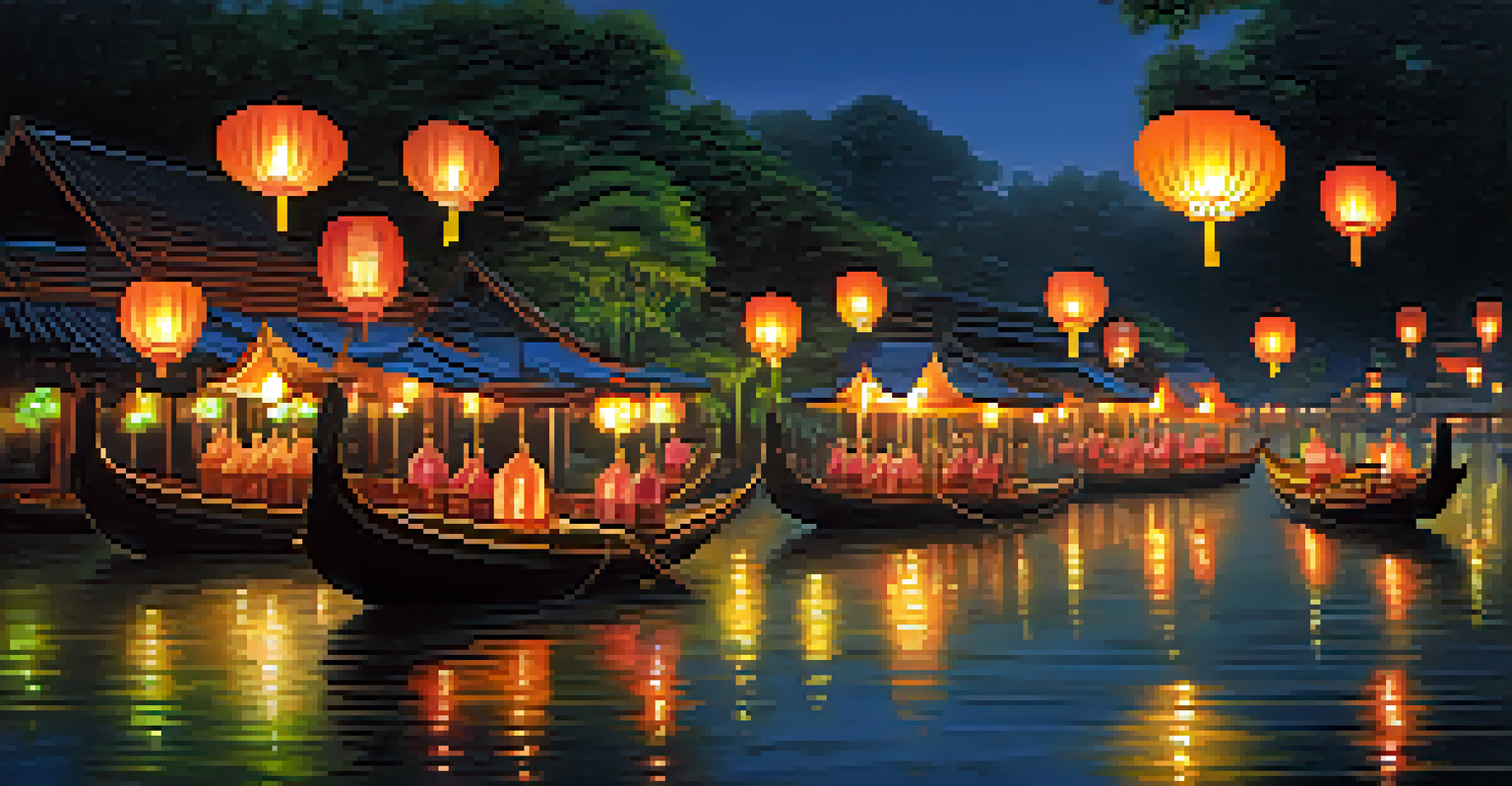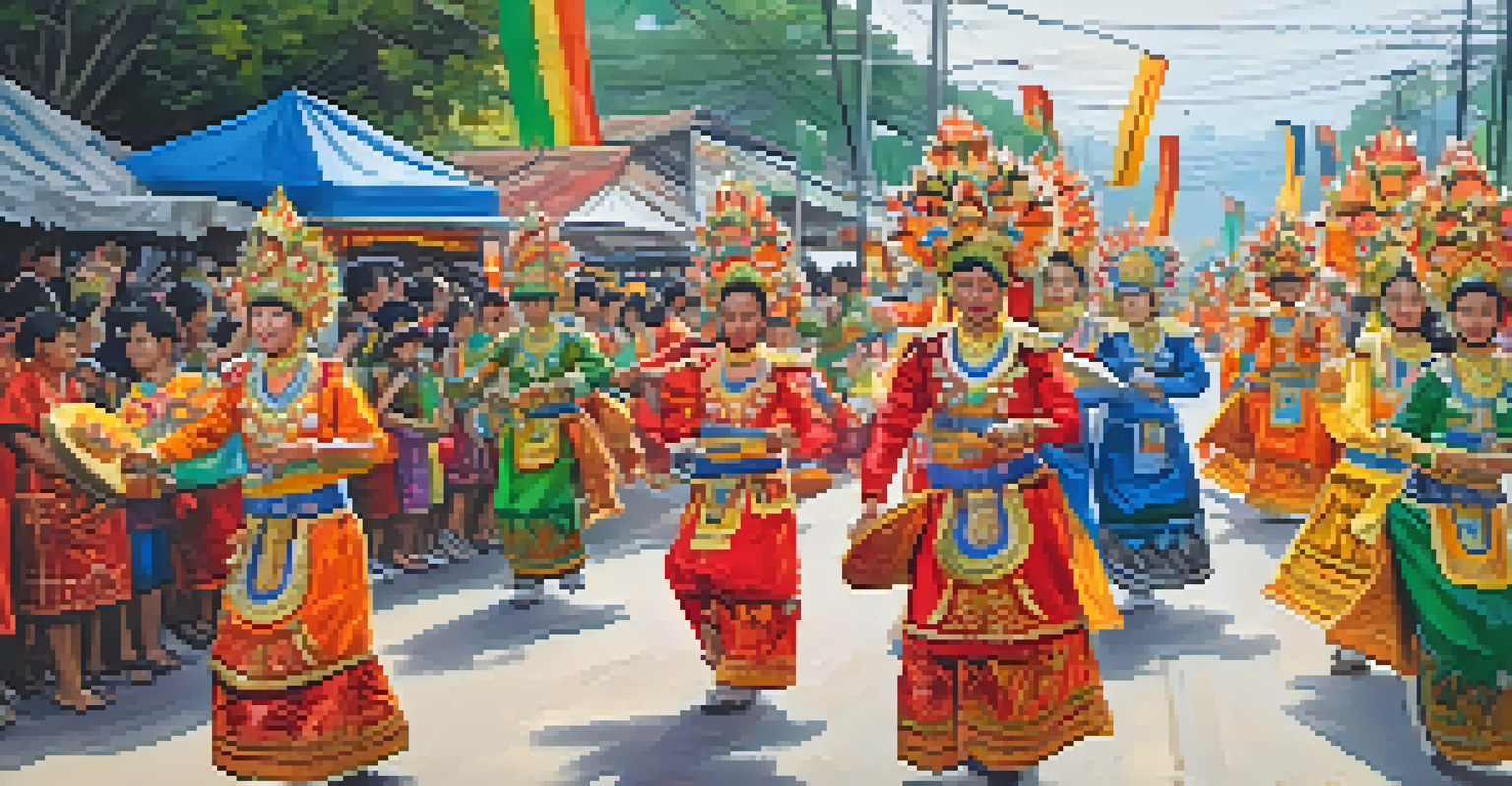The Importance of Thai Festivals: A Celebration of Culture

Thai Festivals: A Window into Rich Cultural Heritage
Thai festivals serve as vibrant windows into the country's rich cultural heritage. Each festival is steeped in traditions that reflect the values, beliefs, and history of the Thai people. From the colorful attire to the melodious music, these celebrations provide a unique glimpse into what makes Thailand so special.
Festivals are a celebration of life, a time to come together and honor our shared traditions.
Cultural heritage is not just about the past; it’s a living part of the present that shapes community identity. Festivals like Songkran and Loy Krathong bring people together, fostering a sense of belonging and continuity. Such gatherings remind participants of their shared history and the importance of preserving it for future generations.
Moreover, these festivals often include rituals that have been passed down through generations, linking the past to the present. This connection helps reinforce cultural pride and encourages younger generations to embrace their heritage. In essence, Thai festivals are a celebration of culture that highlights the rich tapestry of life in Thailand.
Celebrating Community and Togetherness
One of the most notable aspects of Thai festivals is their ability to unite communities. Regardless of age or social status, everyone participates, fostering a sense of togetherness. This collective spirit not only strengthens bonds among individuals but also enhances community identity.

During festivals, the streets come alive with laughter, music, and dance as people gather to celebrate. Traditional games and activities encourage interaction, allowing families and friends to reconnect. The joy and energy are palpable, creating lasting memories that deepen communal ties.
Celebrating Community Through Festivals
Thai festivals unite communities, fostering togetherness and enhancing social bonds among participants.
Additionally, these festivals often include charitable components, where communities come together to support those in need. This spirit of giving reinforces social bonds and highlights the importance of helping one another. Ultimately, Thai festivals are a beautiful celebration of community, showcasing the power of unity.
Preserving Traditions Through Festivities
Thai festivals play a crucial role in preserving age-old traditions and customs. Many of the rituals performed during these celebrations have been handed down through generations, serving as a living history lesson. This preservation is essential for maintaining cultural identity in an increasingly globalized world.
Cultural heritage is a bridge to our past, connecting us to the present and guiding us into the future.
For instance, the intricate dance forms showcased during festivals often tell stories from Thai mythology and history. These performances not only entertain but also educate attendees about their heritage. By participating in these traditions, individuals contribute to the continuity of their culture.
Moreover, festivals provide opportunities for artisans to showcase their crafts, from traditional clothing to intricate decorations. This not only supports local economies but also ensures that these skills are passed on to future generations. In this way, Thai festivals serve as vital platforms for cultural preservation.
Economic Impact of Thai Festivals
Beyond cultural significance, Thai festivals have a substantial economic impact. They attract both domestic and international tourists, generating revenue for local businesses. This influx of visitors boosts the economy and provides opportunities for local artisans and vendors.
Many towns and cities capitalize on festivals by organizing events that highlight local cuisine, crafts, and performances. These attractions not only showcase the uniqueness of each region but also encourage visitors to explore further. The economic benefits extend beyond the immediate event, fostering long-term tourism.
Preserving Cultural Traditions
These festivals serve as vital platforms for preserving age-old customs, ensuring cultural identity thrives in a globalized world.
Additionally, local governments often invest in infrastructure improvements in anticipation of these festivals. This investment enhances the overall experience for attendees, making festivals a win-win for the community and the economy. In this light, Thai festivals contribute significantly to the vibrancy and sustainability of local economies.
A Journey Through Thai Festivals
Thailand is home to a diverse array of festivals, each with its own unique charm and significance. For example, the Songkran Festival, celebrated in April, marks the Thai New Year with water fights that symbolize cleansing and renewal. It’s a time for families to come together and pay respects to their elders.
On the other hand, Loy Krathong, celebrated in November, involves floating beautifully decorated baskets on rivers to pay homage to the water goddess. This festival not only beautifies the landscape but also encourages reflection and gratitude. Each festival offers a distinct experience that adds to the rich tapestry of Thai culture.
Exploring these festivals allows visitors to immerse themselves in local traditions and customs. Whether you're splashing water during Songkran or lighting a lantern during Loy Krathong, these experiences create lasting connections to the culture. Thus, each festival is not merely an event; it’s a journey through Thailand's vibrant heritage.
The Role of Spirituality in Thai Festivals
Spirituality plays a central role in many Thai festivals, reflecting the deep-rooted Buddhist beliefs in Thai society. Festivals often incorporate rituals and ceremonies aimed at honoring spirits and seeking blessings. This spiritual dimension adds depth to the celebrations, making them more than just social gatherings.
For instance, during the Makha Bucha Festival, Buddhists gather to commemorate the teachings of Buddha. The act of participating in temple ceremonies and offering alms is a way to cultivate mindfulness and gratitude. This spiritual engagement enhances the overall festival experience, fostering a sense of peace and reflection.
Economic Boost from Festivals
Thai festivals significantly impact local economies by attracting tourists and supporting local artisans and vendors.
Furthermore, the blend of spirituality and festivity encourages individuals to connect with their inner selves. It provides a moment to pause and reflect on one's life and values amidst the celebration. In this way, Thai festivals become a holistic experience that nurtures both the body and the spirit.
Festivals as an Expression of Creativity
Thai festivals are not only cultural celebrations; they are also a vibrant expression of creativity. From artistic performances to culinary delights, these events showcase the immense talent and creativity present in Thai society. Each festival provides a platform for artists, musicians, and chefs to shine.
For example, during the Phi Ta Khon Festival, participants don colorful masks and costumes, bringing folklore to life through street parades. The creativity on display reflects the rich history and stories that shape the local culture. This artistic expression fosters a sense of pride and encourages innovation within the community.

Moreover, culinary creativity flourishes during festivals, as vendors offer traditional dishes and modern twists on classic recipes. This fusion of flavors allows attendees to experience the diverse gastronomic heritage of Thailand. Ultimately, festivals serve as a celebration of creativity, enriching the cultural landscape.